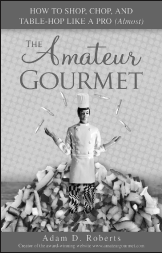By SARAH NORRIS
“I used my law degree to start a food blog,” says Adam Roberts, 28, describing the inception of his popular website, amateurgourmet.com, in 2004. Feeling burnt out during his first year of law school at Emory, in Atlanta, Roberts found solace in cookbooks and the satisfaction of homemade meals — something he never had at home. He grew up in a family that went to a different restaurant every night, the result of an explosive fight between his parents that ended with his mother’s never cooking again. So, following years of perusing menus and opening meals from packages (a la Uncle Ben’s rice bowls), Roberts’ culinary standards for himself were initially very low. “For those of us who come late to the kitchen,” he writes in the introduction of his book, “this is how we begin — we begin as miserable failures.”
Inspired by his new delectable accomplishments — but not willing to devote himself entirely to them — Roberts decided to change his life. Nearing graduation from law school, he printed out a play he had written, applied to the Dramatic Writing program at NYU, and got in. One surprising downside for the Manhattan transplant was his apartment’s lack of a dishwasher. But the good outweighed the dirty, and the two years he spent writing musical theater taught him the importance of structured storytelling.
Meanwhile, his blog, filled with witty travails and original, food-inspired songs like “Great Moments in Musical Theater Featuring Eggs,” gained notoriety for a scathing review of Charlie Trotter’s, the famous Chicago eatery. Strangers attacked Roberts for criticizing the celebrity chef, but Anthony Bourdain, author of “Kitchen Confidential,” came to his defense, arguing that Roberts was entitled to honestly convey his experience. Subsequently, as an homage to Janet Jackson’s wardrobe malfunction at the 2004 Superbowl, Roberts baked naked cupcakes. Within hours, his inbox was flooded, his post had been linked to by dozens, and he had been contacted with a request for a TV interview.
“I put myself out there,” says Roberts. “Blogging is a great calling card.” Two years ago, a literary agent contacted him and suggested he write a book. The result — a tome with the same name as his website — is a charming and energetic part-guide, part-memoir, fueled by an infectious sense of humor and desire to stir things up both in the kitchen and in the lives of the people close to him.
His advice to other amateurs? Start with spaghetti. According to Roberts, tomato sauce is the most rewarding endeavor, for its infinite variations and the meditative quality of making it. “Remember that chemistry set you wanted as a kid? Your kitchen is that chemistry set, only the results are edible.”
Roberts’ curiosity to learn about food and restaurant culture balances the how-to chapters that cast him as teacher and the reader as student. He reaches out to Amanda Hesser and Ruth Reichl, food writers who were formerly (and famously) employed as New York Times’ restaurant critics. He recounts and applies the lessons they impart to him, following Hesser’s advice about food shopping by buying what looks good, and in season. Instead of merely hunting for items on a list penned before seeing what’s available, Roberts suggests shopping as a gatherer. “Great chefs,” he writes, “don’t hone in on a target — they let the target hone in on them.”
The chapter devoted to his lunch with Reichl is divided by her commandments, from “Be a regular” to “Know your hunger.” Similar to the humorous undertone that preceded Roberts’ conversation with Hesser (when she called, he was watching “The Golden Girls”), the meal with Reichl ends on a light note. There are no shoulds, she tells him. “This isn’t a test, this is about pleasure.”
Putting pleasure to the test, Roberts sets about preparing a lavish feast for his friends. A celebration of life and the simplicity of shopping, chopping, and sharing, “The Amateur Gourmet” is helmed by a man who isn’t afraid of biting off more than he can chew. “Because if one thing is true about cooking,” he writes, “it is this: the meek shall not inherit anything in the kitchen.”




































